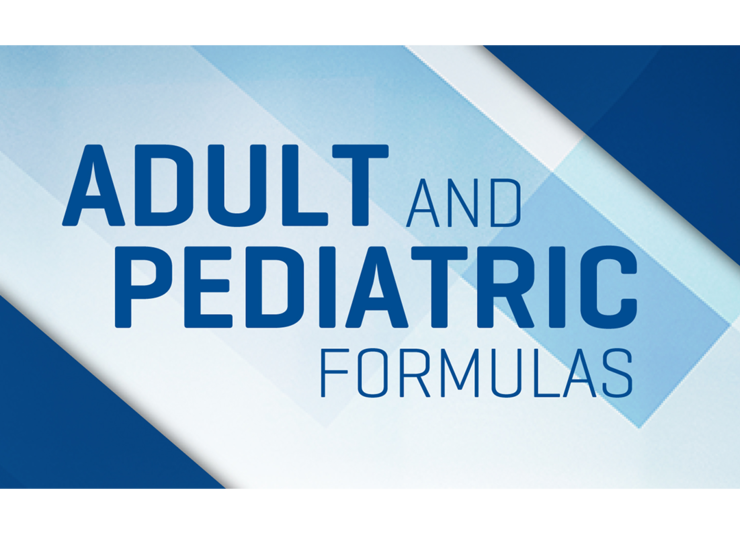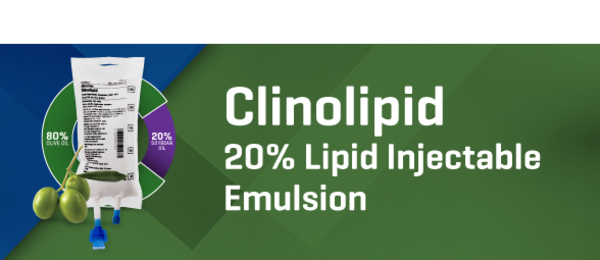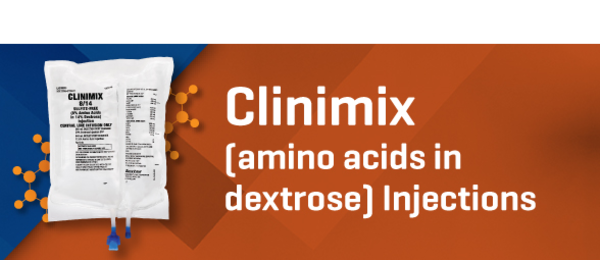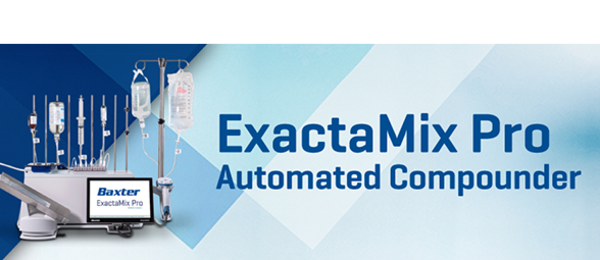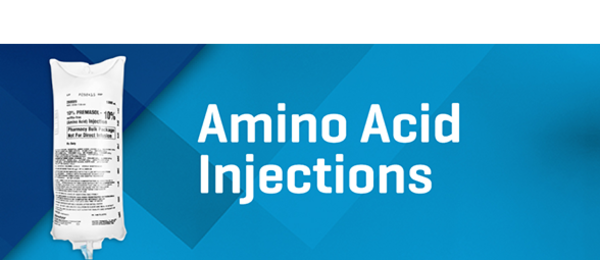Infuvite Multiple Vitamins for Infusion
Multivitamin formulations to meet the daily needs of adult and pediatric patients.
Indications
INFUVITE PEDIATRIC is a combination of vitamins indicated for the prevention of vitamin deficiency in pediatric patients up to 11 years of age receiving parenteral nutrition.
INFUVITE ADULT is a combination of vitamins indicated for prevention of vitamin deficiency in adults and children aged 11 and older receiving parenteral nutrition.
Click here for full Indication(s) and Important Risk Information and see accompanying full Prescribing Information for Infuvite for Adult and Pediatric.
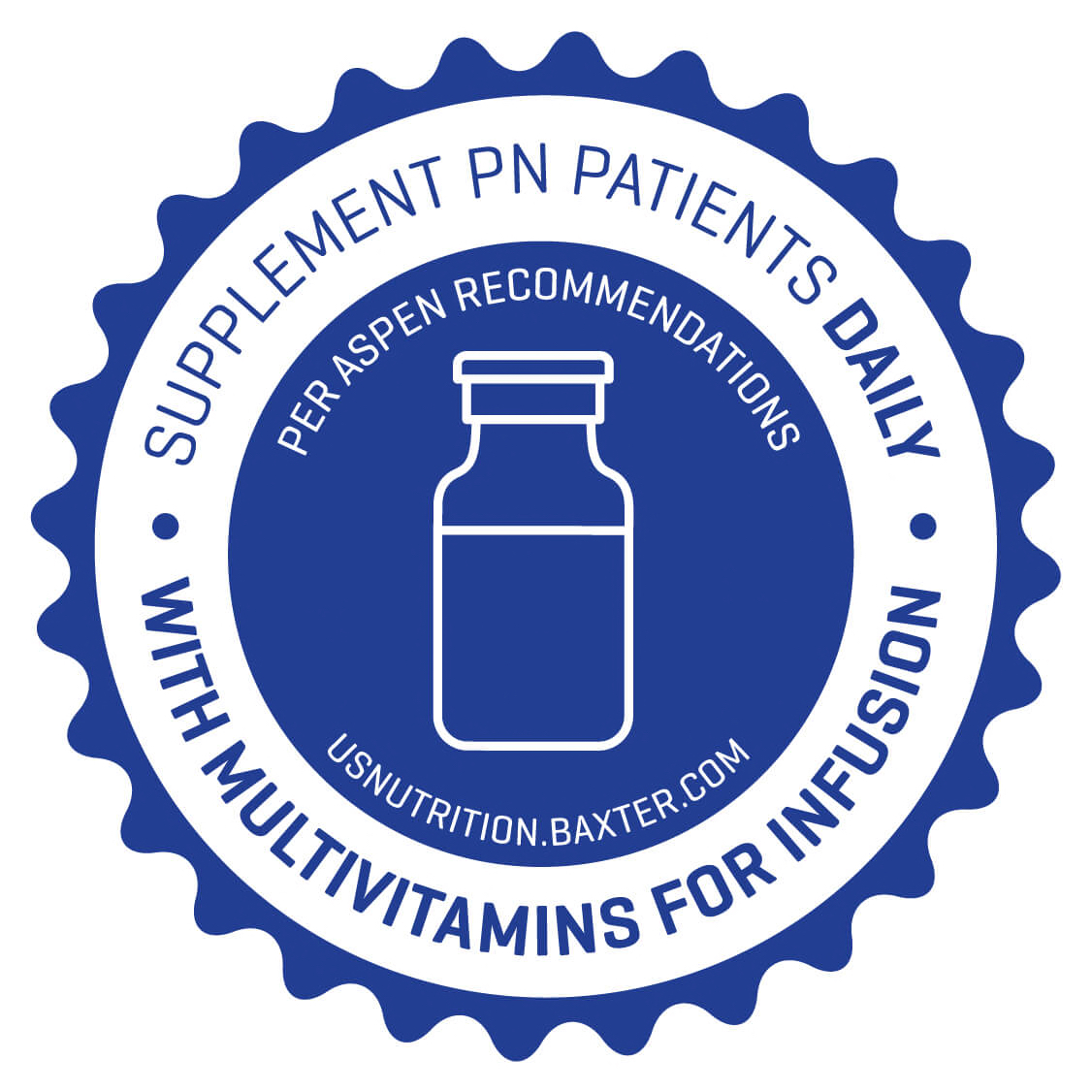
International recommendations and guidelines call for a daily dose of multivitamins for Parenteral Nutrition (PN) patients.1-4
Does your standard PN protocol include multivitamins?
Micronutrients are a critical component to nutritional provision and PN provided without them pose a considerable risk to nutritional status.
Patients receiving PN should receive a daily dose of multivitamins from the start of therapy, per ASPEN PN Safety Consensus Recommendations.1
Supplement PN patients daily with multivitamins for infusion, per ASPEN recommendations.
If Infuvite is the only source of vitamins for a long period of time, blood concentrations of each of the vitamins should be monitored to determine if deficiencies or excesses are occurring.5,6

Low Aluminum Content
Infuvite Pediatric Multiple Vitamins contains not more than 30 mcg/L5 and Infuvite Adult Multiple Vitamins (combined vials 1 and 2) contains not more than 70 mcg/L.6
Aluminum may reach toxic levels with prolonged parenteral administration if kidney function is impaired. Premature neonates are particularly at risk because their kidneys are immature, and they require large amounts of calcium and phosphate solution, which contain aluminum.

Liquid Formulas (Vial 1 and Vial 2, Combined)
Infuvite injectable multivitamin formulations do not not require reconstitution (combined vials 1 and 2). Multiple vitamins must be diluted as part of an IV infusion.5,6
Select Important Risk Information
INFUVITE Adult and Pediatric are contraindicated in patients with hypersensitivity to any of the vitamins or excipients or existing hypervitaminosis. Risk of aluminum toxicity: For at risk patients (renal failure or those with prolonged therapy), consider periodic monitoring of aluminum levels. Allergic reactions to thiamine may occur.
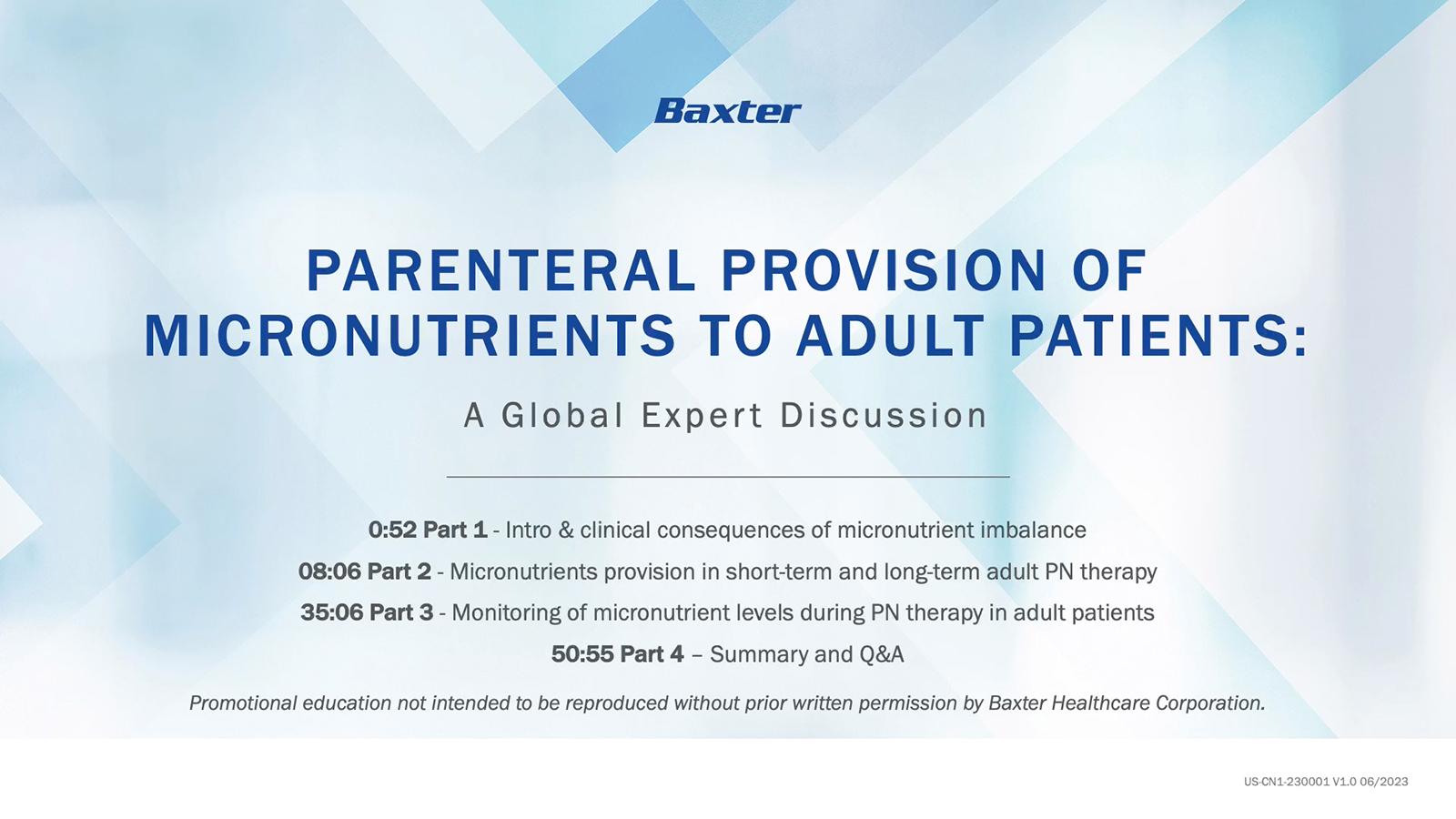
Parenteral Provision of Micronutrients to Adult: A Global Expert Discussion
In this 53-minute panel discussion, four experts talk about the clinical consequences of micronutrient imbalances in adult patients, the micronutrients provision in short-term and long-term adult PN therapy and the monitoring of micronutrient levels during PN therapy in adult patients.
Explore Products for Individualized Clinical Nutrition
Indication(s) and Important Risk Information
INFUVITE PEDIATRIC (multiple vitamins injection), for intravenous use
Indications and Important Risk Information
Indications
INFUVITE PEDIATRIC is a combination of vitamins indicated for the prevention of vitamin deficiency in pediatric patients up to 11 years of age receiving parenteral nutrition.
Important Risk Information
- Contraindicated in patients with:
- Hypersensitivity to any of the vitamins or excipients.
- Existing hypervitaminosis.
- Risk of Aluminum Toxicity: For at risk patients (renal failure or those with prolonged therapy), consider periodic monitoring of aluminum levels.
- Allergic Reactions: To thiamine may occur.
- Hypervitaminosis A: Patients with renal failure or liver disease may be at higher risk.
- Decreased Anticoagulant Effect of Warfarin: Monitor INR.
- Interferes with Megaloblastic Anemia Diagnosis: Avoid during testing for this disorder.
- Risk of Vitamin Deficiencies or Excesses: Monitor blood vitamin concentrations.
- False Negative Urine Glucose Tests: Due to vitamin C.
- Risk of Vitamin E Toxicity: Additional oral and parenteral vitamin E may result in elevated vitamin E blood concentrations in infants.
- Low Vitamin A Levels: Monitor vitamin A levels.
- Risk of E-Ferol Syndrome in Low-Birth Weight Infants: Due to polysorbates.
- Adverse reactions have included anaphylaxis, rash, erythema, pruritis, headache, dizziness, agitation, anxiety, diplopia.
- Effect of INFUVITE PEDIATRIC on other drugs:
- Antibiotics: Thiamine, riboflavin, pyridoxine, niacinamide, and ascorbic acid decrease activities of erythromycin, kanamycin, streptomycin, doxycycline, and lincomycin.
- Bleomycin: Ascorbic acid and riboflavin may reduce the activity of bleomycin.
- Levodopa: Pyridoxine may decrease blood levels of levodopa and levodopa efficacy may decrease.
- Phenytoin: Folic acid may decrease phenytoin blood levels and increase risk of seizure activity.
- Methotrexate: Folic acid may decrease response to methotrexate.
- Effects of other drugs on INFUVITE PEDIATRIC:
- Hydralazine, Isoniazid: Concomitant administration of hydralazine or isoniazid may increase pyridoxine requirements.
- Phenytoin: May decrease folic acid concentrations.
- Pregnancy and Lactation: Pregnant and lactating patients should follow the U.S. Recommended Daily Allowances for their condition, because their vitamin requirements may exceed those of nonpregnant and nonlactating patients
- Renal Impairment: Monitor renal function, calcium, phosphorus and vitamin A levels.
- Hepatic Impairment: Monitor vitamin A levels.
Please click here to see accompanying full Prescribing Information for INFUVITE Pediatric.
INFUVITE ADULT (multiple vitamins injection), for intravenous use
Indications and Important Risk Information
Indications
INFUVITE ADULT is a combination of vitamins indicated for prevention of vitamin deficiency in adults and children aged 11 and older receiving parenteral nutrition.
Important Risk Information
- Contraindicated in patients with:
- Hypersensitivity to any of the vitamins or excipients.
- Existing hypervitaminosis.
- Risk of Aluminum Toxicity: For at risk patients (renal failure or those with prolonged therapy), consider periodic monitoring of aluminum levels.
- Allergic Reactions: To thiamine may occur.
- Hypervitaminosis A: Patients with renal failure or liver disease may be at higher risk.
- Decreased Anticoagulant Effect of Warfarin: Monitor INR.
- Interferes with Megaloblastic Anemia Diagnosis: Avoid during testing for this disorder.
- Risk of Vitamin Deficiencies or Excesses: Monitor blood vitamin concentrations.
- False Negative Urine Glucose Tests: Due to vitamin C.
- Adverse reactions have included anaphylaxis and anaphylactoid reactions including shortness of breath, wheezing and angioedema, rash, erythema, pruritis, headache, dizziness, agitation, anxiety, diplopia.
- Effect of INFUVITE ADULT on other drugs:
- Antibiotics: Thiamine, riboflavin, pyridoxine, niacinamide, and ascorbic acid decrease activities of erythromycin, kanamycin, streptomycin, doxycycline, and lincomycin.
- Bleomycin: Ascorbic acid and riboflavin may reduce the activity of bleomycin.
- Levodopa: Pyridoxine may decrease blood levels of levodopa and levodopa efficacy may decrease.
- Phenytoin: Folic acid may decrease phenytoin blood levels and increase risk of seizure activity.
- Methotrexate: Folic acid may decrease response to methotrexate.
- Effects of other drugs on INFUVITE ADULT:
- Hydralazine, Isoniazid: Concomitant administration of hydralazine or isoniazid may increase pyridoxine requirements.
- Phenytoin: May decrease folic acid concentrations.
- Chloramphenicol: In patients with pernicious anemia, the hematologic response to vitamin B12 therapy may be inhibited.
- Pregnancy and Lactation: Pregnant and lactating patients should follow the U.S. Recommended Daily Allowances for their condition, because their vitamin requirements may exceed those of nonpregnant and nonlactating patients.
- Renal Impairment: Monitor renal function, calcium, phosphorus and vitamin A levels in patients with renal impairment.
- Hepatic Impairment: Monitor vitamin A level in patients with liver disease, high alcohol consumption.
Please click here to see accompanying full Prescribing Information for INFUVITE Adult.

